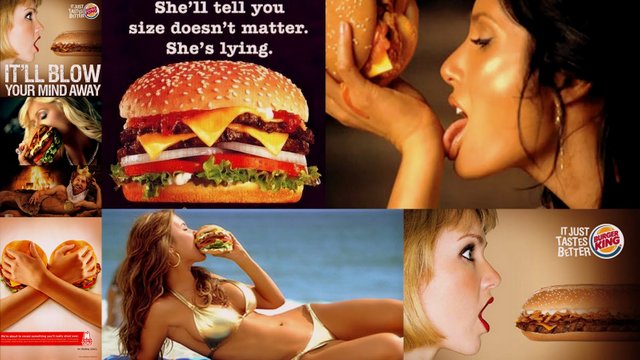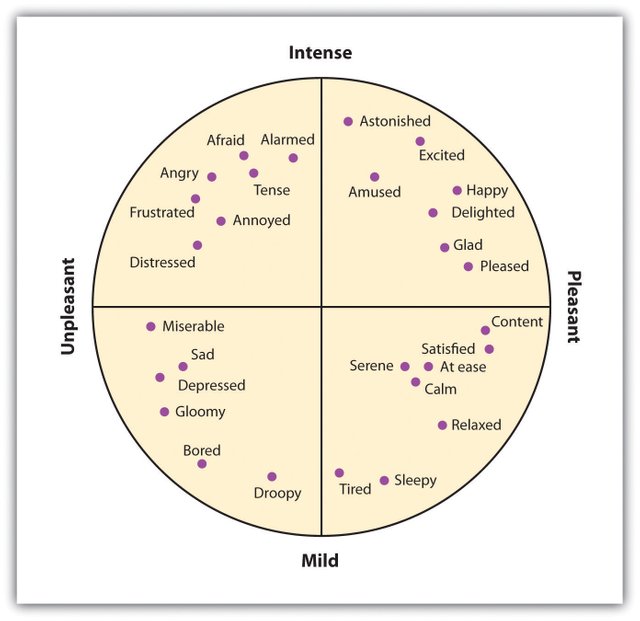Emotions and Motivation
This will be a pretty brief introduction into the psychological study of emotions and motivations (but also not too brief). It is technically for my high school psychology course, but why not share? I am keeping it brief and basic. If you have input to add or other ideas, please feel free to share. I am no psychologist, just curious.
Our Primal Motivations
Our main primal motivations are the needs to drink water, eat food and procreate. There are other needs and motivations in human life of course, but usually, we do not focus on those until our primal and basic needs are met. Water, in most cases, is not too difficult to obtain. Other then water, food and sex are our main primal motivations.
Food is a constant motivation, as it is necessary for our survival. For people who are hungry, it is hard to focus on anything but food. The average person works to afford food, among other things, and even for the richest of the rich, they have the desire and need to eat as well.
“When people are extremely hungry, their motivation to attain food completely changes their behaviour. Hungry people become listless and apathetic to save energy and then become completely obsessed with food.” (Intropsych 10.4).
Hunger itself is controlled by “the interactions among complex pathways in the nervous systems in the brain and body" including our stomach. The hypothalamus controls cues to start and stop eating. When our stomach is empty, we feel hunger. If we have low glucose levels, then various hormones signal for us to eat food. In this way, we maintain a homeostasis, largely through our basal metabolic rate (the amount of energy expended while at rest), meaning that we expend energy and our body signals for us to replenish that energy with food. However, our biology is not the only influence on our appetite or eating behaviours, there are both psychological, environmental and sociocultural influences as well. Sometimes, the sociocultural pressures (and genetics) can be so extreme as to cause diseases, such as the eating disorders anorexia and bulimia nervosa, which are characterized by both starving oneself and binge eating and purging in order to lose weight and sate shame or guilt. On the other side of the scale, there is also the issue of obesity, where excess fat causes a person health issues. Obesity is caused by a range of factors, of which one's metabolism, lifestyle and eating habits are important, and it is also a leading cause of death.
Our third most important need and motivation is sex. It is in fact possibly the most important behaviour we have, as without it our species and our genetics would not exist. Many behaviours are involved in reproduction in humans, such as courtship, sex, relationships, parenting and childcare. There are both biological and psychological motivations for sex, and they go hand in hand. Even people who can’t have sex may have a sex drive. The sexual experience is vast and varied and was first scientifically studied by Alfred Kinsey in the US, who surveyed thousands of people on their sexual behaviours. Masters and Johnson, a couple, also extensively studied sex scientifically, in the 1960s mostly.
They monitored hundreds of people either having intercourse or masturbating, and identified a sexual response cycle, similar in both men and women. The first stage is excitement, where the genitals become engorged with blood and the vagina begins to secrete lubrication. Second is the plateau stage, where breathing, pulse and blood pressure increase as orgasm feels imminent. Thirdly, the orgasm occurs, where males ejaculate sperm and a woman's vagina has spasmodic contractions, which may aid in successful fertilization. The feeling of orgasm is very pleasurable and similar in both men and woman, which probably acts as conditioning so that the sexual act is more likely to be repeated. Lastly, is the resolution stage, where the body returns to its normal state and calms down, and men experience a refractory period where they cannot orgasm again for minutes or even many hours. Women may not enter the resolution stage right away and can experience multiple orgasms before entering the refractory period. Both men and women's sexual desires and sexual response cycles are regulated by testosterone and estrogen respectively.
People are diverse in their sexual desires, even if the biology is similar. Some people have lots of sex, some people experience no sexual desire at all, and people are also varied in their preferred mates. There are varied sexual orientations, and some people like the opposite sex, some prefer the same sex, and some don't care which one a person is. Homosexuality is when someone likes someone else of the same sex, and it has been around for as long as humans have kept documents and occurs in all cultures across the globe despite their different opinions on the matter. It also occurs in other animals. Psychologists have so far failed to find any scientifically valid environmental variables in homosexuality, and from twin studies can at least be shown to have some genetical influences. There is continued research on both nature and nurture sides of homosexuality. Research has shown that a parent's sexual orientation, abusive childhoods, and quality of relationships do not influence a person's sexuality. Some believe that possible prenatal environmental factors might have an impact, and this is research that continues on in the modern day. Sex, sexual desires, and our motivation to have sex could be a giant textbook. There is hardly a more basic and pervasive topic on our earth. Even people who do not want to have sex have their own motivations! In no way can the topic be done justice in a paragraph or two, but this may give you a little insight into the very basics and beginnings of the science of sexuality.

As we can see by modern advertising campaigns, our primal motivations are a good advertisement, and can even be combined for double impact. It feels a little covert to me, to be manipulated by my biology! Does this make you hungry or horny or both???
The Basics of Emotions
Our basic emotions are the fundamental emotions in human beings and include anger, disgust, fear, happiness, sadness, contempt and surprise. They are evolutionary adaptations, and are what make life colourful for us! They are basically integral to the human experience, and all other emotions stem from these basic emotions. They are controlled mostly by our limbic system or our old brain. The basic emotions are also basically universal, displayed and experienced in mostly the same way across cultures. The basic emotions move along the ‘fast pathway’ through the brain, for instance, when you see a bear on the hiking trail the thalamus activates to send an immediate message to the amygdala, and we decide how to act fast, so we begin to back away or reach for the bear spray.
Anyone who is human knows that these are not all there is to emotion, however, because not all of our emotions come from this primal part of our brain. In fact, our brain does a lot of interpreting. This interpretation throughout the rest of our brain creates a variety of complex feelings, along with the cognitive appraisals that accompany our emotions. This way, we know the difference between fear well riding a rollercoaster and the fear well falling off a cliff. In both cases, fear is sensed through the amygdala but is interpreted elsewhere.
Our cognitive appraisals lead to our secondary emotions, which vary along the axis of intense/mild and pleasant/unpleasant. This array of emotion makes up the good and bad of the human experience and include things like love, pride and jealousy. Secondary emotions move along a ‘slow pathway’ from our thalamus and then through our frontal lobes, where the emotions are analyzed and integrated, and from the frontal lobes to the amygdala. Often, we need a cognitive appraisal to figure out the best course of action, but sometimes our emotions guide us well and we make quick and accurate decisions based on emotions alone. Anger is also sometimes described as a secondary emotion as well as a basic emotion because it is universal but also may stem from other emotions and also thought and biological responses, and can take on many different forms.

There are also various theories about how we experience emotions. It is easy to understand that emotions are accompanied by physical arousal. However, psychologists disagree on which order we experience physiological arousal and emotion. The Cannon-Bard theory states that they go together, as you experience fear, for example, your heart rate increases. The James-Lange theory, on the other hand, argues that the emotions are the result of the physical arousal so that our heart rate starts to increase or we start to tremble and this causes the feelings of fear. Both of these theories have empirical, scientific evidence to back them up, and so neither one is considered entirely correct or wrong. There is one more theory, however, the two-factor theory of emotion. It states that “the experience of emotion is determined by the intensity of the arousal we are experiencing, but that the cognitive appraisal of the situation determines what the emotion will be.” This theory states that both the arousal and appraisal are factors in our emotions. There is also some empirical evidence for this idea as well. It has also been shown that we do not always correctly interpret the source of our arousal, which is called the misattribution of arousal, which has many interesting studies.
Anger and Suprise
Anger is not a hard emotion to spot. It is characterized by lowered brows that form a V, raised upper eyelids that contribute to an intense glare, and often crinkles on the nose and forehead. The lips may be firmly pressed together or pulled back over the teeth in a snarl, and the nostrils are probably flared.

The emotion itself is not unknown to anyone. It generally involves antagonism towards something or someone that has been perceived to have wronged you. It can be expressed in many ways. It is interesting to note that anger itself is not necessarily destructive nor constructive (hostility, on the other hand, always is about causing harm). In fact, anger can be a good thing, by allowing a person to express negative feelings and to find solutions to problems, and therefore can actually be a doorway to communication. A person often gets angry when there is an obstruction of some sort in their path, but instead of imedietly destroying the obstruction or threat and attacking, anger allows a person to try and communicate first and yet be ready for action (sympathetic nercous system functions kick in). Often anger is unexpressed or inhibited because the reason for the anger disappears or is reasoned away. Anger also is unacceptable in certain circumstances and remains unexpressed. Anger is also an immediate and sudden response. Anxiety is also correlated with anger because often when anger is suppressed for any reason, the physical reaction still occurs. Also, anger may hide anxiety, and anger itself could be a source of anxiety because people often feel guilty for feeling angry, and when they suppress their anger they could feel even more helpless. It could be said that anger is a defence against anxiety because anxiety is more uncomfortable and does little to solve any solutions. I really love the following quotes in describing anger, from a psychology today blog on understanding anger.
“Actually, anger is highly related to love, both because of its connection to need and involvement and because of its constructive communication aspects. When anger is accompanied by a clear communication, it is a sign of basic respect for a loved person.”
“If we direct our attention to the sense of threat, fear, and insecurity when confronted with an irrationally angry person, his rationality usually returns quite rapidly and his anger subsides. Serious consequences such as violence may be averted”
As these quotes attempt to demonstrate, anger does not need to be feared or a sign of disrespect. It is quite the opposite in many cases, and can helpfully be seen as a plea for communication.
I am only going to touch on surprise, as surprisingly there is not as much information around as anger. Suprise is a universally observed emotion that is usually a reaction to sudden events such as news as a loved one's death, or the sudden and surprising event of a surprise party. It is a very visible emotion that includes widening of the eyes, opening of the mouth and usually a gasp. It can be pleasant or unpleasant, positive or negative. It can induce the flight or fight response, or it may not depending on its intensity. Wikipedia describes surprise as a difference between expectations and reality. Meaning, we get surprised when something unexpected happens, despite our assumptions. An example is that well walking into my grandma's house on Halloween, I did not expect or assume my little brother would jump out from behind a door and scare the bejeebers out of me, so when he did it caused me to also jump back away from the surprising event and only slightly feel a little thrill of adrenaline. My face probably looked very surprised, and everyone laughed. In hindsight, I probably should have expected a scare attempt, it was Halloween and little brothers are known to try and scare older sisters, but because of my expectations (or, I guess, lack of expectations), I was surprised and reacted in a very surprising way! Wikipedia, amazingly, provided a nice quote about surprise and its helpfulness:
"This gap can be deemed an important foundation on which new findings are based since surprises can make people aware of their own ignorance. The acknowledgement of ignorance, in turn, can mean a window to new knowledge."
Turns out, surprise can be helpful in helping us re-evaluate our expectations about reality, and in some cases also put us into fight or flight mode so we are ready to deal with the source of surprise if need be.

Here is a cool site that lets you see 3d facial expressions. It helped me sketch the emotions in this article post thing. http://www.faceturn.com/judgemental/index.php
Thanks for reading :) This was a briefly long post I suppose. More interesting things to come soon :)
Bibliography
[Author removed at request of original publisher]. “Introduction to Psychology.” University of Minnesota Libraries Publishing, University of Minnesota Libraries Publishing edition, 2015. This edition adapted from a work originally produced in 2010 by a publisher who has requested that it not receive attribution., 26 Oct. 2015, open.lib.umn.edu/intropsyc/chapter/10-1-the-experience-of-emotion/. I used all of chapter 10 for this information
Cherry, Kendra. “Emotions and Types of Emotional Responses.” Verywell, www.verywell.com/what-are-emotions-2795178.
Boundless. “Influence of Culture on Emotion.” Influence of Culture on Emotion | Boundless Psychology, courses.lumenlearning.com/boundless-psychology/chapter/influence-of-culture-on-emotion/.
Lafountain, Felecia. “F.Civi.” Sign Systems: Examples of Advertisements, Posters, or Billboards, 1 Jan. 1970, fciviwords.blogspot.ca/2013/10/sign-systems-student-led-discussion-wk4.html.
Nugent, Pam M.S. “What is SURPRISE? definition of SURPRISE (Psychology Dictionary).” Psychology Dictionary, 10 July 2015, psychologydictionary.org/surprise/.
Parvez, Hanan. “PsychMechanics.” Facial expressions: Anger, Blogger, 6 Dec. 2015, www.psychmechanics.com/2015/06/facial-expressions-anger.html.
Rothenberg, Albert. “Understanding Anger.” Psychology Today, Sussex Publishers, 17 June 2017, www.psychologytoday.com/blog/creative-explorations/201706/understanding-anger.
“Sexual Motivation.” AP Psychology Community, www.appsychology.com/Book/Motivation/sexual_motivation.htm.
“Surprise (Emotion).” Wikipedia, Wikimedia Foundation, 9 Oct. 2017, en.wikipedia.org/wiki/Surprise_(emotion).
I love psychology! Upvoted. I also followed you.
sweet I will be sure to post more psychology soon!
love it i always think that i have no emotions regardig anythig why is it so??
that is an intersting question. I figur eyou probably need a real psychologist to help you dig into that issue, but I can say that if you supress negative emotions you also supress good ones, or maybe your hormones and neural chemicals are messed up. If it is a real concern find a psychologist!